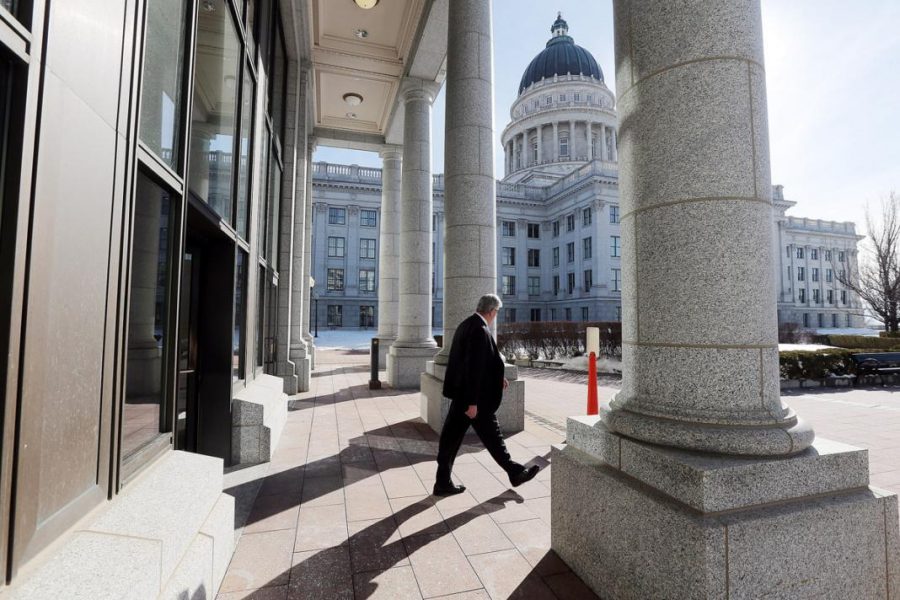The following is the final piece of a three-part series highlighting the companies, advocates and legislators central to the Second Amendment dialogue in Utah.
Despite the tremendous effort of students and lobbyists to enact gun control measures in Utah, the 2018 legislative session ended without a substantial reform to any existing policy. Several bills introduced to the House of Representatives failed to garner support, including Rep. Stephen Handy’s (R-Layton) House Bill 483, which would have allowed courts to remove firearms from those deemed mentally ill. The willingness of Utah legislators to defend the Second Amendment is a benefit few states may claim, protecting local gun manufacturers and ensuring the vitality of individual liberty.
The sheer immensity of Parkland’s #NeverAgain movement is undeniable and has arguably led to recent alterations of gun laws in Florida and Vermont. Following the shooting at the Marjory Stoneman Douglas High School, Utah’s House Speaker, Greg Hughes, called on lawmakers to enact changes post haste. Announcing his impending retirement after 15 years in the legislature, Hughes used his political capital to create the Utah School Safety Commission, comprised of law enforcement, education, health care and gun rights advocates.
The intent of the commission is to “compel Utah Gov. Gary Herbert to call state legislators back into special session to pass them,” according to The Salt Lake Tribune.
Reports indicate Hebert is open to such a move, though lawmakers will likely stop short of enacting the radical gun control demanded by left-wing millenials. As The Salt Lake Tribune noted, members of “the Utah School Safety Commission includes Clark Aposhian, a gun rights advocate and chairman of the Utah Shooting Sports Council; Dallas Earnshaw, superintendent of the Utah State Hospital; [BYU] sociology professor John Hoffmann; Keith Squires, commissioner for the Utah Department of Public Safety; Ron Gordon, general counsel for Herbert; Bryan Turner, an architect with Davis School District; Utah Education Association president Heidi Matthews; and Terryl Warner, a member of the Utah Board of Education.”
Though Hughes attempted to address what he believes is needed in legislation, Utah Senate President Wayne Niederhauser (R-Sandy), cautioned moving too quickly would ultimately create issues for gun owners. Given modern communication systems, individuals believe there ought to be no delay between protest and legislation; thankfully, mature legislators, such as Niederhauser, indicated the obvious: mixing raw emotion with policy is a recipe for disaster. He later altered his position and admitted such a bill might be beneficial, though it ought to be carefully analyzed. Whether Herbert will be compelled to call a special session is yet to be seen, though it will be intriguing to see what changes are made.
Other bills that were considered, but ultimately dropped during the legislative session included Rep. Norm Thurston’s (R-Provo) HB328, which sought to address the “unintended consequences” of Utah’s recent shift to a 0.05 blood alcohol level limit. Those considered legally intoxicated as a result of the new mandate would have been allowed to operate a firearm in their homes for self defense. Oddly, Thurston later admitted he did not support the law, but believed he must attempt it on behalf of a group of criminal defense attorneys.
Handy’s HB483 was unique in its attempt to provide Utah’s judicial branch with the capacity to legally seize firearms from those deemed mentally unfit. The House Law Enforcement and Criminal Justice Committee voted 7-4 against HB483, citing the bill would erode the Due Process Clause of the 14th Amendment, “noting that it would be difficult for people accused of being dangerous to prove that they weren’t.” While the bill did not pass the legislature this year, it will remain in the House Rules Committee until the next legislative session in 2019. Throughout that time, further study will be conducted to better understand how such a law might affect Utahns.
Those living in Utah benefit from the legislature’s fierce protection of individual liberty, especially given recent expansions of concealed carry permits. Reports indicate nearly 1,400 individuals between 18-20 years old have a valid permit to conceal a firearm on their person, further benefitting from Utah’s Castle-Doctrine and Stand Your Ground legislation. Given the state’s burgeoning firearms industry — including manufacturers such as Browning, Christensen Arms, Black Rifle Coffee and Vista Outdoors — lawmakers cannot afford to create too many waves.
Recent controversy has embroiled House Rep. Mia Love after a piece in the Deseret News reported her saying “everything has to be on the table” just days after the Parkland, Florida shooting. The article continued by citing her apparent support of banning so-called bump stocks and indicating interest in regulating the sale of semiautomatic rifles. Undoubtedly these comments were inspired by her upcoming re-election run against Salt Lake County Mayor Ben McAdams — a lawmaker slightly more effective than Mayor Jackie Biskupski, although that should hardly be considered a compliment.
The unfortunate outcome of these comments forced Love to backtrack after Utah Democrats released a picture of her standing with board members from the Utah Shooting Sports Council. During the 2016 election cycle, Love received nearly $63,000 from gun rights groups, totaling more than Utah’s entire delegation combined. Others including Sen. Mike Lee, Sen. Orrin Hatch, Rep. Rob Bishop and Rep. Chris Stewart have all received donations from gun advocates, though claiming that relatively insignificant contributions have altered legislative decisions is rather witless.
Mayor McAdams sided with the right, admitting to The Salt Lake Tribune that “Utah’s concealed carry laws seem to be working the way they are now.” The solutions he envisions includes outlawing bump stocks — a measure supported by President Donald Trump — and raising the age limit for purchasing assault-style weapons. How moderate.
Aside from purely economic benefits, the The National Rifle Association granted $828,500 in grants to Utah organizations meant to promote shooting sports and outdoor activities. Thankfully, Utahns may rest assured that legislators will continue to fiercely defend the Second Amendment.
@TheChrony


